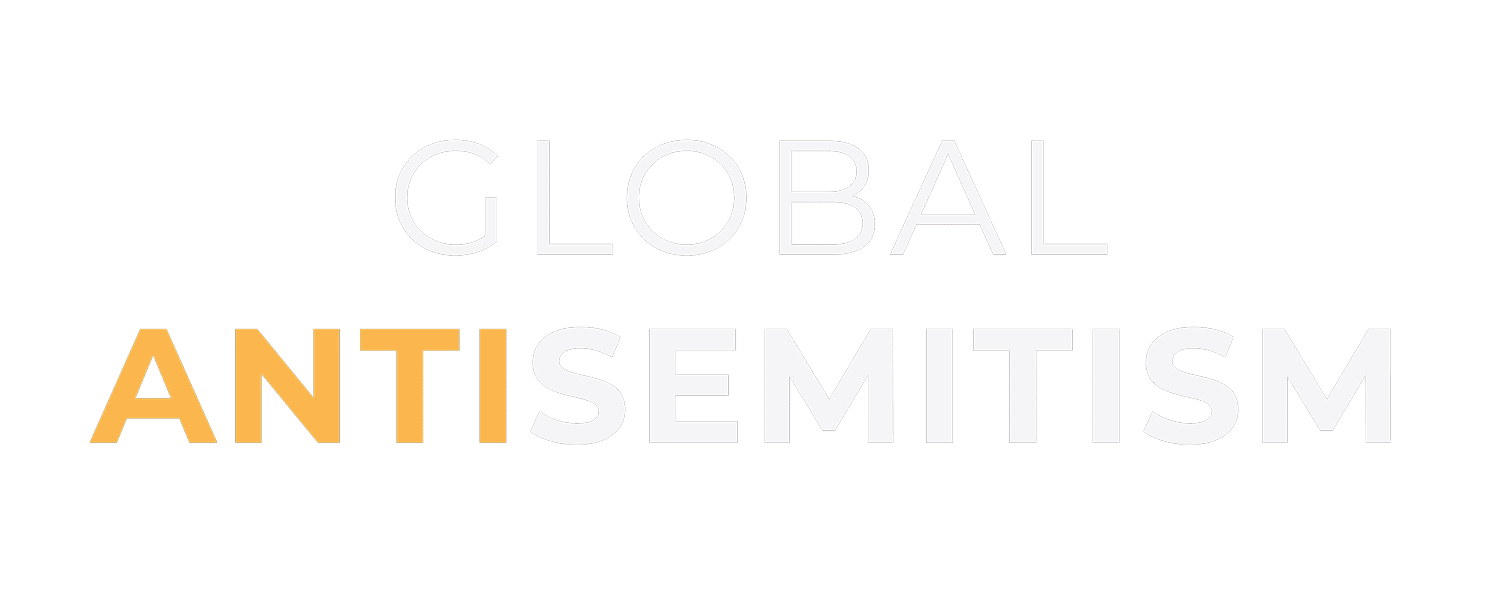
Warning:
Global Antisemitism Is Growing!
Dear friend,
Shalom in His grace. There is another unseen virus wreaking destruction upon God’s chosen people today that demands our attention. That virus is antisemitism.
This newsletter will look at the unfortunate growth and virulence of modern antisemitism in North and South America. We will also look at contemporary European antisemitism, including the United Kingdom.
We witnessed synagogue members in Pittsburgh murdered in 2018 simply because they were Jewish. Anti-Jewish slogans and graffiti regularly mark our college campuses today, fueled by hatred of the Jewish people and often further inflamed by posts on social media.
Antisemitism all too often expresses itself through political opposition to the State of Israel. It leads to various movements such as BDS (Boycott, Divestment, Sanctions) and other groups actively opposing the Jewish state. But antisemitism is not a term we want to throw around lightly, as this “oldest hatred” is now considered a hate crime.
The U.S. State Department in cooperation with the International Holocaust Remembrance Alliance (IHRA), developed a non-legally binding “working definition” of antisemitism in 2016, which is generally accepted across the globe: “Antisemitism is a certain perception of Jews, which may be expressed as hatred toward Jews. Rhetorical and physical manifestations of antisemitism are directed toward Jewish or non-Jewish individuals and/or their property, toward Jewish community institutions and religious facilities.”
The Anti-Defamation League also provides an excellent definition of antisemitism, defining it as “the belief or behavior hostile toward Jews just because they are Jewish. It may take the form of religious teachings that proclaim the inferiority of Jews, for instance, or political efforts to isolate, oppress or otherwise injure them. It may also include prejudiced or stereotyped views about Jews.”
Antisemitism is on the rise in the United States, and it is essential for us as a Jewish mission to address this crucial topic. My people often blame Christianity for antisemitism because of tragic events like the Crusades, Pogroms in Russia, and the Holocaust. WE believe that loving Jesus the Jewish Messiah is incompatible with antisemitism. Yet, the fear of Christianity because of past actions by alleged Christians created a deep antipathy on the part of Jewish people toward the gospel, which is why it is so crucial for us to dispel this association between Jesus and antisemitism.
That is the underlying purpose for this issue of the newsletter. We designed it to help you pray and better understand some of the reasons for Jewish opposition to the gospel message. It will also help us create a positive testimony to the Jewish people by showing our understanding and love through opposing this heinous “spirit of the age” that is on the rise today!
The Spiritual Roots of Antisemitism
We always need to view life’s critical issues through the lens of Scripture. The roots of antisemitism are ancient and have changed dramatically over the centuries. What started as Greek and Roman disdain morphed into theological anti-Judaism in the early and medieval church. It became racial antisemitism in the nineteenth century leading to the murder of more than six million Jewish people. At the time Adolf Hitler implemented his catastrophic “Final Solution,” antisemitism was primarily racial. If you had a Jewish mother or father, or even a Jewish grandparent, you were declared Jewish, placed in a concentration camp, and likely put to death.
But, if we pull back the curtains of time and history and consider the role God gave to the Jewish people in the redemption of the world, it becomes evident that the roots of antisemitism are spiritual and satanic. When God chose Abram to become the father of the Jewish people, the devil chose the Jewish people to be his perennial enemy (Genesis 12:1–3).
Throughout biblical history, we see attempt after attempt to destroy the Jewish people, which was predicted by the ancient Jewish prophets, especially Daniel. He envisioned the Jewish people’s oppression by Babylon, Medo-Persia, Greece, and Rome in the post-Old Testament period. The Bible never mentions the antisemitism-inspired activities of the Crusaders, the Russian and Ukrainian pogroms, or the Holocaust. The Bible also did not predict the attacks in Pittsburgh at the Tree of Life Synagogue on October 27, 2018, when eleven Jewish people were killed. Nor did it foresee the attack at the Chabad congregation in Poway, California, on April 27, 2019, when Lori Lynn Gilbert-Kaye was killed, and others shot, only for being Jewish.
The reasons for hating the Jewish people have changed over time, but the source remains the same. The devil is not all-knowing like God, but he truly believes he can thwart God’s plan. That is why he has focused on destroying the Jewish people throughout the ages. Satan hates the Jewish people because he knows that it was through the Jewish people the Lord revealed Himself through the Scriptures. At the right moment in history, God unveiled Himself through His Son by choosing a young Jewish virgin to give birth to the Jewish Messiah (Isaiah 7:14)!
God is not finished with His chosen people. There is so much more to come! One day, the Jewish people—whom God promised to preserve—will repent, recognize Jesus as Messiah, and the Lord will return and establish His Messianic kingdom on earth (Romans 11:25–29).
Antisemitism is satanic. A good friend of mine once said, “We need to love what the devil hates!” As followers of the Jewish Messiah, we have a holy duty to bless the Jewish people, which fulfills His sacred purposes and demonstrates our loyalty to the One who chose the Jewish people for His divine purposes.
What Can We Do Today to Counter Antisemitism?
We should counter antisemitism and enlist the help of the church to do the same.
We should counter antisemitism as a witness of God’s love for Israel and the Jewish people.
We should help mobilize Christians to stand with the Jewish people in opposing antisemitism. These activities could save Jewish lives.
We should post messages of love and support for our local Jewish communities on Facebook, Twitter, or even encourage our pastors to use their church marquees.
We should provide believers with information about the Jewish people and antisemitism. Good communication helps believers better understand God’s love and plan for the Jewish people.
Please pass this newsletter along to your Christian friends, and write to us, we will send you additional copies.
A Call to Action:
Some things are just too horrible to let pass!
That was the theme of an article that appeared in a newspaper. The horrible act that could not go unnoticed was the writing of antisemitic statements on a subway car’s walls in New York City—my hometown. Several good Samaritans saw the remarks and came up with the idea of erasing them, using hand cleaner that had high alcohol content to cut through the thick, waxy strokes of a sharpie pen. I cannot tell you how happy I am that New Yorkers took the initiative to act on their outrage and eradicate these despicable statements. Their quick-thinking act of righteousness demonstrates to me that New Yorkers—and Americans, in general—believe we have a culture of freedom, respect, and goodness that is worth preserving. We are willing to put our most cherished values into action.
As a Jewish New Yorker who follows Jesus the Messiah, I am impressed by what these good citizens did on behalf of the Jewish people, especially since the newspaper does not indicate that those who erased the graffiti were Jewish. I long for my fellow believers to take the same kind of actions when we see antisemitism rear its ugly head in our local communities. I would love to see local churches make a public stand against antisemitism. What a testimony that would be of Christ’s love to your local Jewish community!
When believers in Jesus take personal or public stands against antisemitism, they express God’s heart for His chosen people, which is one way to bring your Jewish friend another step closer to thinking about Jesus.
Thanks for your prayers and generous support! I hope that the newsletter will bless you. I am sure you will find it informative. I pray that you and your family will have a safe, healthy, and fruitful 2021.
In Him,
Mitch
Dr. Mitch Glaser

United States
Antisemitism has been rapidly increasing in the United States in recent years. According to a recent survey of 1,334 American Jews conducted in 2020 by the American Jewish Committee (AJC), a leading global Jewish advocacy organization, 9 out of 10 American Jews believe antisemitism is a problem in the United States. More than 4 out of 5 American Jews reported believing that antisemitism has increased over the past 5 years.
More than one-third of those surveyed reported personally experiencing antisemitism over the last five years. “Notably, younger respondents—American Jews between the ages of 18 and 29 and between 30 and 49—were more likely than older respondents to have been targets of antisemitism, four out of ten (41%) saying they’ve been victims of an antisemitic incident, compared to 31% of those over 50.” The AJC further reported that increasing antisemitism on college campuses primarily accounted for this difference.
The study also found that more than 37 percent of participants said they sometimes try to conceal their Jewish identity to avoid being targets of antisemitism. One-third said they sometimes avoid places and situations out of fear of being targeted for being Jewish. Comparably, 55 percent of Orthodox Jews surveyed said they avoid places and situations for that reason.
Unfortunately, the American Jewish perception of antisemitism as reported by the AJC reflects the actual state of antisemitism in the United States. According to the Anti-Defamation League, an international Jewish non-governmental organization, 2019 saw the highest number of antisemitic incidents in the United States since the organization began tracking in 1979. “[It] was a year of unprecedented antisemitic activity, a time when many Jewish communities across the country had direct encounters with hate,” said Jonathan A. Greenblatt, CEO of the ADL.
According to the ADL report, 2,107 antisemitic incidents were reported in 2019, averaging 6 antisemitic incidents per day. Those incidents fall into 3 categories: harassment, vandalism, and assault. There were 1,127 incidents of harassment, 919 incidents of vandalism, and 61 incidents of assault, a 56 percent increase from the previous year. Of the incidents of vandalism and property damage, 756 of the occurrences included the drawing of swastikas on Jewish property. Of the assault incidents, 95 Jewish people were harmed, and 5 were murdered. Many of the incidents specifically targeted Jewish synagogues and community centers, including the shooting in the Chabad center of Poway, California, which resulted in Lori Kaye’s death, a 60-year-old Jewish woman who at the time was mourning her mother’s death.
The ADL report found that the incidents occurred in 48 states, with no occurrences in Hawaii and Alaska. “The states with the highest numbers of incidents were New York: 430; New Jersey: 345; California: 330; Massachusetts: 114; and Pennsylvania: 109. These states combined account for nearly 45 percent of the total number of incidents,” the ADL reported. More than half of the antisemitic assaults took place in the 5 boroughs of New York City, including 25 in Brooklyn alone.
Latin America
Today, the current state of antisemitism in Latin America is not as bad as it is in other parts of the world. However, in the past, Argentine antisemitism was much worse because many Nazi refugees fled to Argentina after World War II. More than 250,000 Jews now live in Argentina and have integrated into Argentina’s society and politics.
On July 18, 1994, Argentina suffered the vilest terrorist attack of any Jewish community in the world. Terrorists bombed the Argentine Israelite Mutual Association (AMIA—Asociación Mutual Israelita Argentina) building in Buenos Aires. A van loaded with explosives was detonated, killing eighty-seven individuals and injuring more than one hundred. To this day, nobody has apprehended the perpetrators, and it took almost twenty-one years for Argentina’s parliament to vote to compensate victims and their relatives. In a well-known incident, the Jewish prosecutor, who sought to demonstrate a link between Iran, the attacks on the AMIA building, and a former president, was assassinated. Authorities are still investigating this allegation.
According to the Simon Wiesenthal Center, only eighteen percent of Argentina’s population harbors antisemitic sentiments. “Latin America has not seen the physically violent antisemitism that other parts of the world have experienced through terrorist attacks,” says Ariel Seidler of the Latin American Jewish Congress. “There are antisemitic incidents, but in general Jewish communities can freely practice their faith.” Ariel Gelblung of the Simon Wiesenthal Center for Latin America claims that antisemitism in Latin America is “nowhere near what Jewish communities are experiencing in Europe and the United States.”
Brazil has large Jewish communities in São Paulo and Rio de Janeiro, and thankfully there have been no significant antisemitic demonstrations or attacks in recent years. Most evangelical pulpits in Brazil preach a debt of love and support for Israel. Brazil’s current president claims to be a born-again Christian, as do many members of parliament. This tremendous evangelical presence is openly supportive of the Jewish people and the State of Israel.
The most vociferous antisemitic attacks are currently taking place in Chile. Although the Jewish population is only about 15,000, Chile has almost 500,000 people who identify as Palestinian. They represent one of the largest Palestinian populations outside of the Middle East, and they openly attack Israel and the Jewish people, albeit only verbally.
Venezuela once had 20,000 Jewish people, but since the socialist takeover by Hugo Chavez in 1998, fewer than 2,000 Jews have remained in the country; most of them have emigrated to Argentina and Colombia.
Uruguay has always been a beacon of tolerance, and although small in comparison to its giant neighbors, Argentina and Brazil, its economic stability has always attracted Jewish immigration. Its most severe antisemitic attack occurred in 2016 when an Islamist murdered David Fremd. The police investigation found antisemitic material downloaded from the Internet on the perpetrator’s computer. However, there have been no antisemitic attacks against the growing Hasidic population or any other less visible Jewish institution or persons in Uruguay.
Compared to other regions of the world, Latin America has not experienced a significant increase in antisemitic activity. Hopefully, it will stay this way. However, instability in the Middle East, the unresolved Palestinian situation, and the annexation of portions of the West Bank and the Golan Heights could be the spark that, at a moment’s notice, ignites opposition against Israel and the Jewish people in Latin America.
Europe
Over the last two decades, we have witnessed a resurgence of global antisemitism. Though repackaged and repurposed, it continues targeting Jewry worldwide. The perpetrators have changed, but the victims remain the same. Even within the “New Antisemitism,” we often see a role reversal where the Jewish people and Israel are painted as the perpetrators while the world views the real perpetrators as victims.
Europe has been a hotbed of antisemitism for a long time. Even though there seemed to be some respite from the end of the Second World War to the mid-1960s, “the longest hatred” is in full force again. About seventy-three percent of European Jews choose to hide their Jewish identity because of fear of antisemitism.
In very recent years, France has seen the death of more than a dozen Jewish people on multiple occasions, not to mention the myriad of tombstone defacements and various property damages at synagogues. In one case, a Jewish woman was thrown out of her Paris apartment window, to her death, simply because she was Jewish. France still has the largest Jewish community in the diaspora (460,000) outside of the United States, but it is decreasing. About 50,000 Jews have left France in the last thirty years, many of them to become citizens of Israel.
The United Kingdom (300,000) is also a dangerous place for a Jewish person in the twenty-first century. There has been a long struggle within the British Labour Party to tame, if not silence, its former leader Jeremy Corbyn from dispensing his antisemitic vitriol. Considered to be a very safe place for Jews after World War II, the United Kingdom is seeing such a rise in antisemitic incidents that British Jews are also leaving for Israel. A ray of hope is the fact that Holocaust education remains compulsory in British schools.
Germany, Belgium, Greece, Italy, Spain, and many other European countries share in the guilt of rampant antisemitism. Not all incidents are reported, and many are often wrongly categorized to minimize the situation’s gravity and ignore their antisemitic nature.
We might be seventy-five years past Nazi Germany, yet our people are still at risk. We need to educate ourselves, educate others, speak up, and stand up for Israel and the Jewish people. Today, as Christians, we have a biblical mandate to love Israel and pray for our Jewish friends and loved ones. Though antisemitism will not go away, our God is bigger, and He is certainly not finished with Israel!


Jewish Woman Comes to Faith During Hanukkah
Janice* was raised in a reform Jewish family in Ohio. After years of searching for satisfaction in secular pursuits, she yearned for a spiritual connection. Last spring, she found an online traditional Passover Seder and really enjoyed it, but she hungered for more. From that traditional Jewish website, she noticed one of our online Chosen People Ministries ads and registered with us. We, in turn, invited her to join us online in December. Janice joined our Hanukkah Havurah (small group) and showed great interest. Through further conversations, Janice was intrigued about the Messiah and had many questions. Not long after, one of our staff members led her in the “sinner’s prayer.” She is now being discipled. Please pray for Janice as she grows in her faith.
*Name changed

Young Orthodox Man Comes to Faith in Israel
During the past year, with the outbreak of the pandemic, there has been a huge increase in Internet usage among the Haredim (ultra-Orthodox Jewish group living in closed communities). In following the restrictions imposed by the government to slow the spread of COVID-19, many rabbis have started to teach the Torah online. Chosen People Ministries—Israel has also increased online activities to continue to serve the people at this time with restrictions to congregating. As a result, many people from the Haredi community are searching for the gospel online! Recently, Dovid,* a young Haredi man in his late twenties, has come to faith in Jesus! He saw our online service, the message touched his heart, and he approached our congregation and requested lessons on the foundations of the Messianic faith. After the classes, he decided to dedicate his life to Jesus and underwent water baptism. This is a huge step since water baptism is a public acknowledgment of faith in Jesus; many Haredi believers remain secret believers to protect their lives and livelihood. Please continue to pray for Dovid, that by the grace of God he will continue to grow and be strengthened in the faith and grow in his calling, whatever the Lord may have in store for him.
*Name changed

Egyptian Jewish Man Comes to Faith on Christmas
James 5:16 says, “The effective prayer of a righteous man can accomplish much.” Your prayers have made it possible for us to welcome another Jewish person into the kingdom! This past fall, Avi,* a Jewish man from Egypt, attended one of our Chosen People Ministries congregations for the Jewish High Holidays. He seemed hesitant at first, but he had many questions and kept engaging with our staff member. On the day after Christmas, he told our staff member, “I’ve been born again!” Our holiday messages focused on the love of God, which He made perfectly clear in the sacrifice of His Son, our Messiah, Jesus. Avi shared that he heard those messages and went home and read the first six chapters of the Gospel of John. He told a friend with whom he was reading, “This is true,” and he prayed to receive Messiah into his heart! Praise God for this wonderful news! Pray for Avi as he grows in his faith and is discipled.
*Name changed
Share the Jewish Messiah with Jewish people
and receive a steady income stream for life
Establishing a Charitable Gift Annuity is a great way to share the message of Jesus with Jewish people… and when you do it, you also generate a lifetime income for yourself.
If you are 65 years of age or older, you can establish a Charitable Gift Annuity (CGA) at Chosen People Ministries today with a minimum gift of $10,000. This will provide you, or you and your spouse, with income for life!
Also, establishing a CGA is a rewarding way to express your heart’s desire for the cause that you care so deeply about—sharing the Messiah with the Jewish people.
It is simple!
- Contact Chosen People Ministries to speak with a CGA specialist.
- Establish your CGA with a gift of cash, stocks, bonds, or other appreciated assets.
- Realize an immediate tax deduction.
- Receive income for life (without the worry of what the stock market is doing) on a schedule that you set up monthly, quarterly, or annually.
Take a quick look at the chart below with rates of return, published by the American Council of Gift Annuities (ACGA). It shows you the excellent rates of return available, based on your age.
| Age | Rates of Return |
| 65 | 4.2% |
| 70 | 4.7% |
| 75 | 5.4% |
| 80 | 6.5% |
| 85 | 7.6% |
| 90+ | 8.6% |
For answers to your questions regarding year-end giving options, contact Cindy Forbes at 212-223-2252, ext. 1208 or [email protected] today!



